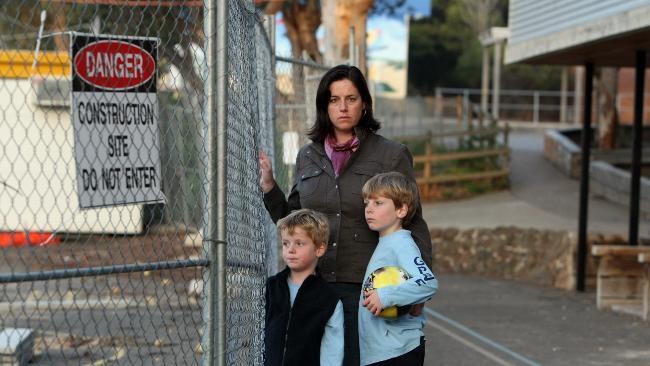Report reveals school divide over BER
BUILDERS, architects, councils and school principals have delivered a damning report card on Julia Gillard's school building program in Victoria.

BUILDERS, architects, councils and school principals have delivered a damning report card on Julia Gillard's school building program in her home state, including allegations of rorting, long delays, inflated costs and inept management.
A Victorian parliamentary inquiry into the implementation of the $16.2 billion Building the Education Revolution program has revealed for the first time the extent of the discontent among Victorian principals.
More than 50 submissions were made to the Education and Training Committee inquiry -- initiated by opposition parties in the upper house -- in which schools raised complaints about being kept in the dark, extensive delays over projects, and not knowing whether they were getting value for money, because the Victorian government has refused to release project costs to the public.
Ocean Grove Primary School principal Darryl Diment likened the construction fences that divided his school grounds for 12 months while they waited for the BER project to start to a Berlin Wall that "segregated our children".
"In history, there have been many revolutions that start in a blaze of glory and evaporate into thin air," Mr Diment wrote in his submission.
Leesa Snookes, who has her two sons at Ocean Grove Primary School, said parents were angry about the delays to the BER project.
"I am not happy with how long it has taken to begin and how long the kids have not had a playground, a footy oval and a basketball court," Ms Snookes said.
"My son has lost a football over the construction fence. It's an abyss."
Building companies and architects raised concerns about the program failing to use local tradesmen and stimulate regional economies, management of the projects being taken out of the schools' hands and builders losing thousands of dollars while construction sites lay empty waiting for planning permits.
In Victoria, BER projects were run by the state Education Department for greater efficiency.
School principals and parent councils were not given financial details of projects or control over construction.
However, a major building company hired to carry out works on 33 schools told the inquiry that construction costs were inflated and the building permit fees were "considerably higher than we normally pay".
BDH Constructions managing director Henry Bongers said: "The designs of most of the templates would be some of the most expensive we have been involved with on a square-metre basis mainly due to the shapes and structural design."
He also said that building permits took too long and, as a result, many sites that had been set up and fenced "lay dormant" for up to four months.
"I believe that with better planning and more consultation with building industry representatives, the whole process would have been more organised, streamlined and had much better value for money," Mr Bongers wrote in his submission.
Another builder, Vaughan Constructions, described as "rorting" the practice of bundling individual projects into a single, large contract to enable workers to be paid an additional hourly site allowance.
Vaughan Constructions general manager Andrew Noble said the practice, which was endorsed earlier this year by the Victorian Building Industry Disputes Panel, "has major consequences to the cost of the BER program".
Horsham Rural City Council raised doubts about the limited use of local builders in the BER process and "the minimal economic benefits" to the local economy.
"This appears to be very evident in Horsham and Wimmera, a region which has been impacted by the long-term drought and, more recently, the Black Saturday bushfires," said Tony Bawden, economic development general manager. "To our knowledge, the bulk of tenders let in our region have been to builders from outside the region."
The Masters Builders Association of Victoria also expressed concerns about the cost of building permits, which it says blew out to four times greater than normal in Western Victoria.
Several schools complained about not getting value for money or being disadvantaged by being a government school and having the Victorian department run the BER program. Bannockburn Primary School council president Les Rowe wrote in his school's submission: "Our building is to be the same size as a school portable yet is costed at least three times this amount."
Fish Creek and District Primary School principal Robin Smith told the inquiry he did "not believe the timeliness, the transparency, or the final product delivers best value to our community".
Mr Diment, whose Ocean Grove Primary School falls in Labor's marginally held seat of Corangamite, said he still did not know when his school's BER project was going to be completed.
"As we approach our one-year anniversary, the children look longingly between the gaps in the fence for signs of progress," he wrote. "Almost one year ago today our school had a fence erected. In something akin to the Berlin Wall, it segregated our children from the bike shed, the chook shed, the vegetable patch and the remnants of the oval . . . in almost 12 months of 'progress' what visible signs of development are there?"
A Victorian government spokeswoman said only 20 government schools made submissions to the inquiry.


